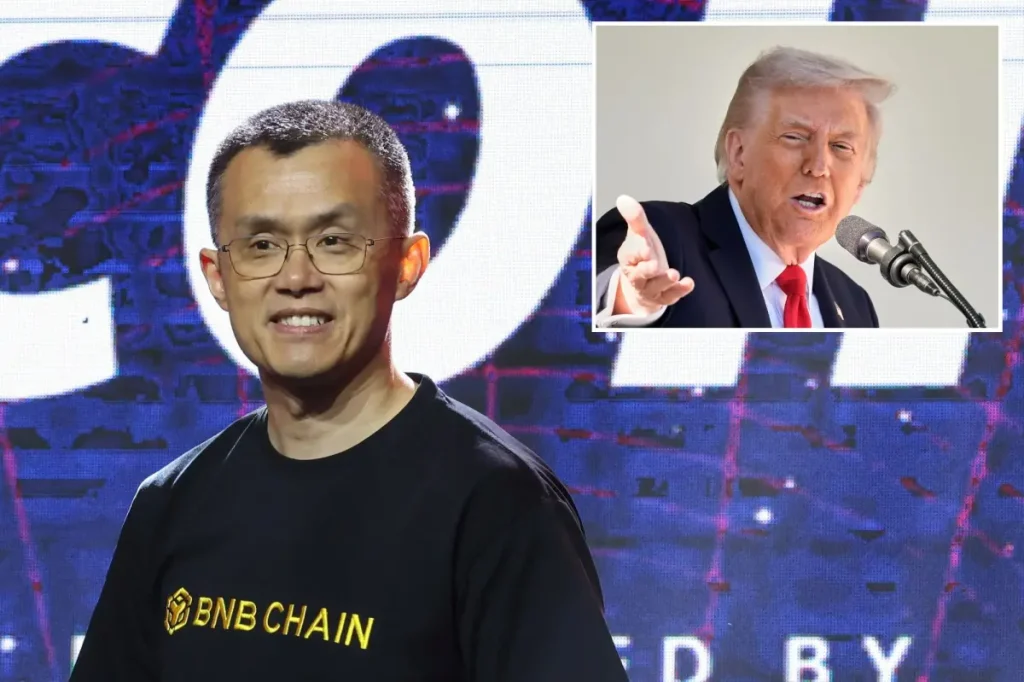Trump Pardons Binance Founder Changpeng Zhao in Significant Move for Cryptocurrency World
In a significant development for the cryptocurrency sector, President Trump has granted a full pardon to Changpeng Zhao, the founder of Binance, who had previously been convicted and served prison time. The White House officially announced the decision on Thursday, with Press Secretary Karoline Leavitt framing the pardon as a response to what the administration characterizes as “the Biden Administration’s war on cryptocurrency.” This executive action represents another instance in a growing pattern of Trump pardoning business executives convicted of white-collar crimes, particularly those in innovative or emerging industries like cryptocurrency. The pardon has immediately sparked discussions about the implications for both Zhao’s future and the broader cryptocurrency regulatory landscape in the United States.
Changpeng Zhao, widely known as “CZ” in the cryptocurrency community, had established himself as one of the most influential figures in the digital asset space before his legal troubles began. After founding Binance in 2017, he built it into the world’s largest cryptocurrency exchange, revolutionizing how millions of people around the world bought, sold, and traded digital assets. His journey from software developer to crypto billionaire made him a symbol of the industry’s explosive growth and potential. However, his rise was interrupted when Binance came under intense scrutiny from U.S. regulators, ultimately resulting in a massive $4.3 billion settlement with the government to resolve allegations of misconduct and regulatory violations. As part of that settlement, Zhao stepped down from his position as CEO of the company he had built from the ground up.
The legal case against Zhao centered primarily on allegations that Binance had failed to implement proper anti-money laundering controls and had allowed the platform to be used for potentially illicit activities. These charges are similar to those faced by other cryptocurrency exchange leaders who have also received pardons from President Trump, including the founders of BitMEX. After pleading guilty, Zhao was sentenced to four months in prison, which he had already completed at the time of the pardon. The pardon effectively wipes away his conviction, potentially allowing him to return to a leadership role in the cryptocurrency industry and at Binance specifically, though the company has not yet commented on whether he might rejoin the organization he founded. The pardon removes a significant legal barrier that would have otherwise restricted his ability to operate in the business world.
Trump’s decision to pardon Zhao aligns with his administration’s increasingly crypto-friendly stance, which represents a stark contrast to the more regulatory approach taken during the Biden years. This pardon follows similar clemency granted to other business executives, including the founders of BitMEX cryptocurrency exchange who faced similar anti-money laundering charges, the founder of electric truck company Nikola who was convicted of fraud, and the executive of the now-defunct media startup Ozy Media whose sentence Trump commuted. These actions collectively signal the administration’s position on how certain business practices and regulatory violations should be treated, particularly in emerging industries that face evolving regulatory frameworks. The pattern suggests a preference for business innovation over strict regulatory enforcement, especially in sectors that appeal to Trump’s base of supporters.
For the cryptocurrency industry as a whole, the pardon could signal a significant shift in the regulatory environment. Many crypto entrepreneurs and investors have expressed frustration with what they perceive as an overly harsh regulatory approach toward digital assets during the previous administration. Trump’s pardon of a major figure like Zhao might be interpreted as an indication that his administration will take a more permissive stance toward cryptocurrency businesses, potentially encouraging innovation in the space. However, critics may view the pardon as undermining important regulatory safeguards designed to prevent financial crimes and protect consumers. The tension between innovation and regulation remains a central challenge for the cryptocurrency industry, and this pardon is likely to intensify debates about how best to balance these competing priorities.
As Zhao potentially prepares to re-enter the cryptocurrency world with his legal slate wiped clean, questions remain about what this means for Binance and for the broader industry. The $4.3 billion settlement that Binance reached with the U.S. government remains in effect, and the company has implemented significant compliance improvements since Zhao’s departure. Whether he will return to Binance or pursue other ventures in the crypto space remains to be seen, but his pardon removes a significant obstacle to his continued participation in the industry he helped shape. For crypto entrepreneurs and investors watching these developments, the pardon might be interpreted as a sign that the regulatory winds are shifting in their favor, potentially encouraging greater investment and innovation in blockchain and cryptocurrency technologies. As the industry continues to mature and integrate with the traditional financial system, the implications of this pardon will likely reverberate for years to come.


